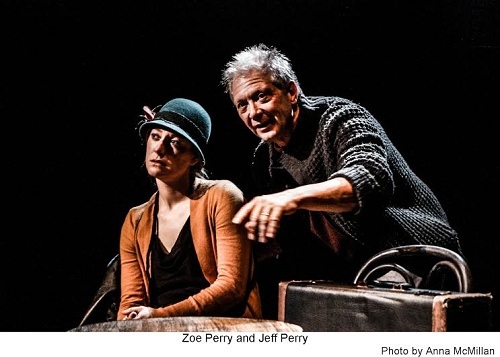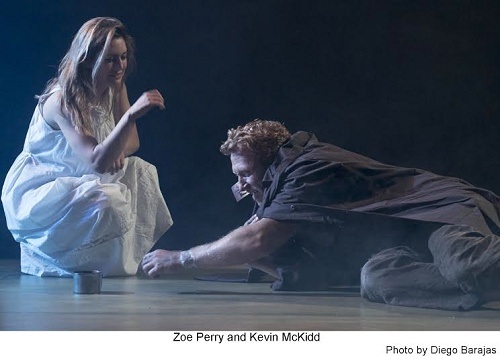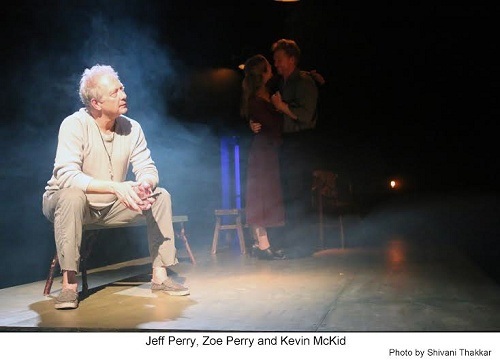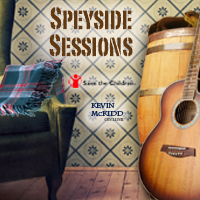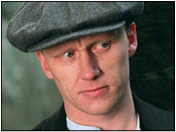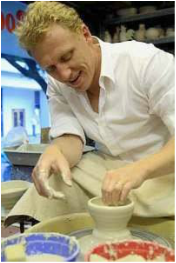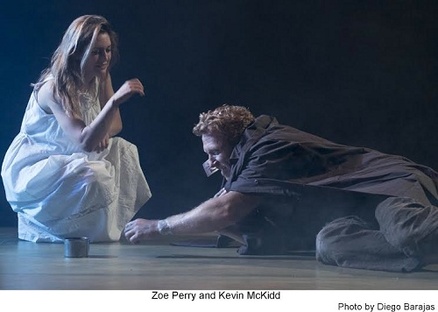
January 25, 2015
ANNA CHRISTIE STILL ENGAGING AFTER ALL THESE YEARS
By Patrick Hurley
Do people change? The timeless question, a storytelling trope as old as the sea, is at the heart of Eugene O’Neill’s Pulitzer Prize winning play Anna Christie, playing now through March 8 at the Odyssey Theatre. A wily, older seaman Chris (Jeff Perry), working coal barges and spending all his time ashore in a tavern with Marthy, (Mary Mara) the woman who lives on the barge with him, receives a letter that his daughter Anna (Zoe Perry) is on her way to see him for the first time in fifteen years.
....
Kevin McKidd is wonderful as Mat. He creates a thuggish yet tender brute who is as much led by his sensitivity and passion as he is by his libido, and this carries him from one heightened moment to the next. Mr. McKidd finds many different layers, he’s not just personified machismo, nor is he a dupe. He is aware that many different sides of Mat can exist at the same time, and his fully fledged performance is both raw and exciting to watch.
read the full review here: "Anna Christie Still Engaging after all these years"
or after the break
Source: https://thatawesometheatreblog.wordpress.com/2015/01/25/anna-christie-still-engaging-after-all-these-years/
Anna Christie Still Engaging After All These Years
By Patrick Hurley
Do people change? The timeless question, a storytelling trope as old as the sea, is at the heart of Eugene O’Neill’s Pulitzer Prize winning play Anna Christie, playing now through March 8 at the Odyssey Theatre. A wily, older seaman Chris (Jeff Perry), working coal barges and spending all his time ashore in a tavern with Marthy, (Mary Mara) the woman who lives on the barge with him, receives a letter that his daughter Anna (Zoe Perry) is on her way to see him for the first time in fifteen years.
Enter Anna, a troubled and nervous girl who orders whiskey and smokes cigarettes. It’s clear from nearly her first spoken lines that Anna is a woman with a maligned past, come to start a new life. Details of her life as a prostitute come to light later in the play, but are by no means revelatory. O’Neill clearly wants us to know from the start what kind of past Anna has had.
Chris is delighted to see her, but his joy is short lived, for he soon discovers that she is in need of a place to stay, which means he will have to take her with him on the barge. One of the reasons Chris hasn’t seen Anna in all those years was because he didn’t think growing up on the sea was anyway for a proper girl to be brought up. Chris views the sea as a malevolent force that prays upon the innocent, “dat ole davil, sea” is how he refers to it. But without any other choices, Chris leaves Marthy behind, and he and Anna board his barge and head out to sea.
It was a foggy night…there was a shipwreck…you know that old story.
Enter Mat Burke (Kevin McKidd) an Irish sailor who seeks refuge on Chris’ barge, after surviving a wreck and rowing small boat for days and days through thick ominous fog. The night of his sudden arrival, Anna is alone when he appears in the water just next to her. This production makes clever use of a small water tank that surrounds the stage to introduce Mat. After Mat boards the barge he is overcome with desire for Anna, most likely he hadn’t seen a woman in quite some time, and his desire gets the better of him. He basically attacks her. Much to his chagrin, Anna fights back and she nearly kills him. It must be love.
Then, in true 1920s fashion, Anna and Mat do indeed fall in love. Their courtship is short and sweet and before you know it, Mat wants to marry her. All of this, of course, in defiance of Chris, who believes it’s the curse of the sea that has driven his innocent daughter into the arms of man less than worthy of her.Anna 2
Anna, on the other hand, is haunted by her less than honorable past, and feels unworthy of Mat and breaks it off with him. When pushed by Mat into giving him a good reason why she won’t marry him, Anna unburdens herself to Chris and Mat the story of her past, who both respond with equal abhorrence. The truth, at least for Anna becomes a freeing mechanism that allows her the chance for growth, an idea that must have been shocking to a 1920s audience. Hers is not a sugarcoated tale. It powerfully still resonates with our own current ideas about independence, love, and rebirth. O’Neill, at least in this moment, has created in Anna a strong and authentic woman who faces a life of solitude rather than surrender to fraudulence. This is hardly radical to a contemporary audience, but still evocative and necessary and ultimately human. Anna’s renaissance may be a product of the times, and the plays final act does sway away from feminism and more patriarchal conformity. However, the steps in which it takes to get to Anna, Chris, and Mat’s conclusions are by no means misogynistic, they are simply of a different era.
This production goes for a minimalist approach. The sets are small, the stage and space are small, and the walls are painted solid black—which is highly effective under minimal lighting and a house filled with fog, there is a sense of void. The lighting, designed by Michael Gend, almost becomes a character because it is readily relied upon to create mood and tension. The way in which the lighting was used was almost expressionistic. Isolated spotlights creating shadows, lamps on the floor, glowing yellow and white, and overhanging lights that create pockets of darkness between them, the lighting was deliciously atmospheric and moody, which made the minimalistic sets feel much more alive. The fog machine was a bit too much for two and a half hours, the effect wore off simply because there was always fog. Atmospheric, yes, but it ultimately overstays its welcome.
The live music, by saxophonist Martin Gutfeldt was an interesting touch. It worked most of the time, but sometimes was a bit jarring. In the first half of the play when he was off stage, the music would come in as if it were a sound cue, and without a visual of what it was we were hearing, it pulled us out of the action of the scene. When we could see him playing in the foggy shadowy world of the play, it added a nicely nuanced noir feeling to it that was unexpected but effective.
As for the water, it was a bold choice, to put a small tank of water around the stage, and to then use it by having Mat’s entrance be face down in it. But after that, it felt like a gimmick. It seemed that the actors became too aware of the fact that they had to fall in it, or put their feet in it, or walk through it. It was simply overused. As a theatrical device that highlighted the unnaturalness of this very naturalistic play, it was interesting, but as a literal device meant to symbolize rebirth and cleansing, it was too on the nose.
Director Kim Rubinstein makes wonderful use of the space, the lighting, and the actors. And she does this, for the most part, in one very specific way: She keeps it simple. She has moments of beautiful composition, she knows where to place the actors to create tension and heighten the mood. The beauty of O’Neill’s language isn’t overplayed. She doesn’t create unnecessary staging to keep things moving. She allows lengthy interchanges to transpire between the characters without props, without movement, and sometimes without a set. She understands the greatness that is alive beneath the text, and we get a peek underneath it because Ms. Rubinstein doesn’t try to direct the dialogue. A mistake easily made with O’Neill. It’s this minimalist approach that allows us to hear and understand what O’Neill is essentially telling us rather than just what the characters are actually saying.
As Anna, Zoe Perry is quite good. She handles the woman’s contradictions and desires effortlessly, and only gets into a bit of vocal trouble when she has to reveal her true self to Mat and Chris. It’s a moment she doesn’t lose emotionally, but can’t quite handle vocally. It’s a minor flaw in an otherwise solid and very honest performance. Anna’s scenes with Mat, especially, highlight Ms. Perry’s deft understanding of all of Anna’s contradictions and depth. Jeff Perry as Chris also suffers with a vocal issue, his however, is almost the opposite. He does such a good job maintaining Chris as an affable guy, that his outbursts are too big. He’s almost too vocal. He seems to get too upset too easily and it’s always with a jerking of his body, a slamming of his fist and a raising of his voice that just takes us out of some of the more honest moments. When he brings that down and has his quiet moments, however, he’s very good. Kevin McKidd is wonderful as Mat. He creates a thuggish yet tender brute who is as much led by his sensitivity and passion as he is by his libido, and this carries him from one heightened moment to the next. Mr. McKidd finds many different layers, he’s not just personified machismo, nor is he a dupe. He is aware that many different sides of Mat can exist at the same time, and his fully fledged performance is both raw and exciting to watch.
This production hits nearly all the right marks. It takes its time with the source material, and interprets it through a nicely refined lens. It boasts honest and interesting performances, and shows us why the naturalistic world of Eugene O’Neill, nearly a hundred years ago, can still be engaging, exhilarating, and utterly relevant.
Anna Christie
By Eugene O’Neill
Directed by Kim Rubinstein
Jan 24-Mar 8
Odyssey Theatre
2055 S. Sepulveda Blvd.
Los Angeles CA. 90025
310.477.2055
www.odysseytheatre.com
Tickets: $34.99
